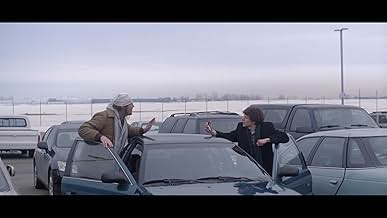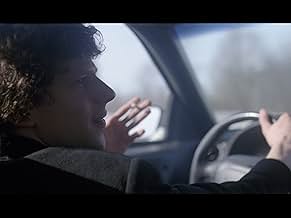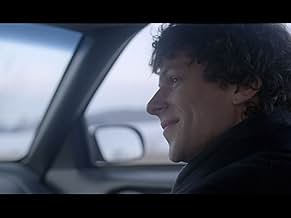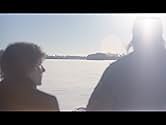The story of the five-day interview between Rolling Stone reporter David Lipsky and acclaimed novelist David Foster Wallace, which took place right after the 1996 publication of Wallace's gr... Read allThe story of the five-day interview between Rolling Stone reporter David Lipsky and acclaimed novelist David Foster Wallace, which took place right after the 1996 publication of Wallace's groundbreaking epic novel, 'Infinite Jest.'The story of the five-day interview between Rolling Stone reporter David Lipsky and acclaimed novelist David Foster Wallace, which took place right after the 1996 publication of Wallace's groundbreaking epic novel, 'Infinite Jest.'
- Awards
- 4 wins & 18 nominations
- Bookstore Patron 2
- (as Jennifer Holman)
- Director
- Writers
- All cast & crew
- Production, box office & more at IMDbPro
Storyline
Did you know
- TriviaThe song heard on the soundtrack when the film ends is "The Big Ship" by Brian Eno, one of David Foster Wallace's favorite songs. It was also used for the climax of Me and Earl and the Dying Girl (2015), another film that premiered at the 2015 Sundance Film Festival.
- GoofsIn regards to the scene where Mrs. Gunderson gives Mr. Wallace and Mr. Lipsky a car tour of Minneapolis sites: The Mary Tyler Moore statue on Nicollet Mall in Minneapolis, was not given to the City by TV Land until 2002. Also, it is not legal for cars to drive down Nicollet Mall.
- Quotes
David Foster Wallace: It may be in the old days what was known as a spiritual crisis: feeling as though every axiom in your life turned out to be false... and there was actually nothing. And that you were nothing. And that it's all a delusion and you're so much better than everybody 'cause you can see how this is just a delusion, and you're so much worse because you can't fucking function.
- Crazy creditsHalfway through the closing credits, there is an extra scene told from the perspective of David Foster Wallace as Lipsky goes to the bathroom to wash out the chewing tobacco. It shows what Wallace did while he was in the bathroom: he speaks privately into the tape recorder.
What little there is of plot is made up for in excellent characterization. The film is really all about existentialism, and thankfully it never leans towards pretentiousness. Rather there is an air of optimism about making your time on earth worthwhile. Wallace and Lipsky in a way represent two extremes of existentialism. Wallace is very relaxed, and takes his newfound celebrity with a grain of salt, while Lipsky is very Type-A, yet never brash or irritating. Lipsky has been trying to get his foot in the door as an author for a while now, while Wallace almost became famous overnight, and the film plays with the concept of "fame" in fun and unique ways. Through the film, Ponsoldt is able to explore these two extremes and find common ground between them, all while touching on the idea of fame and what it means to different people.
The script is outstanding, and hits all the right notes I touched on above. The dialogue between Lipsky and Wallace feels natural, nothing is forced. I wonder how much improvisation was done for the film, because the two seem like good friends from the moment they meet. There is a natural chemistry that draws these two characters together, and it's outstanding to watch on-screen. It's difficult to adapt a book like Lipsky's, which is mostly interviews and recording, as the book was published after Wallace's death in 2008. But screenwriter Donald Marguiles makes it work, and the result is an insightful, often hilarious film.
All this talk about chemistry would be a waste if it weren't for Jason Segel and Jesse Eisenberg as Wallace and Lipsky, respectively. Segel is a marvel as Wallace; it's a performance that doesn't demand much, yet Segel taps into all of Wallace's nuances and quirks. His delivery, cadence, and warmth almost makes it feel like you're talking to an old friend. It's a subtle performance that I hope is remembered come awards season. Eisenberg, too, is great. His reporter-type isn't very developed until the middle-end of the film, and he might come across as annoying for some. But he makes Lipsky tick as the curious interviewer wanting to learn more. He's driven by his desire to success, his want to make a successful piece for Rolling Stone, yet he ends up with a lot more.
The End of the Tour is a huge success. It isn't a very showy film, without much in the way of technical prowess, yet it's a talker. The realistic dialogue and blasé tone make the film feel like a 140 minute hang out with two good friends. Ponsoldt keeps a tight grip on the film's themes, never letting one overpower the film's true intentions. It's a wonderful ode to Wallace, and a funny one at that.
- joey-ziemniak
- May 7, 2015
- Permalink
- How long is The End of the Tour?Powered by Alexa
Details
Box office
- Gross US & Canada
- $3,002,884
- Opening weekend US & Canada
- $123,238
- Aug 2, 2015
- Gross worldwide
- $3,072,991
- Runtime1 hour 46 minutes
- Color
- Sound mix
- Aspect ratio
- 2.35 : 1
Contribute to this page



































